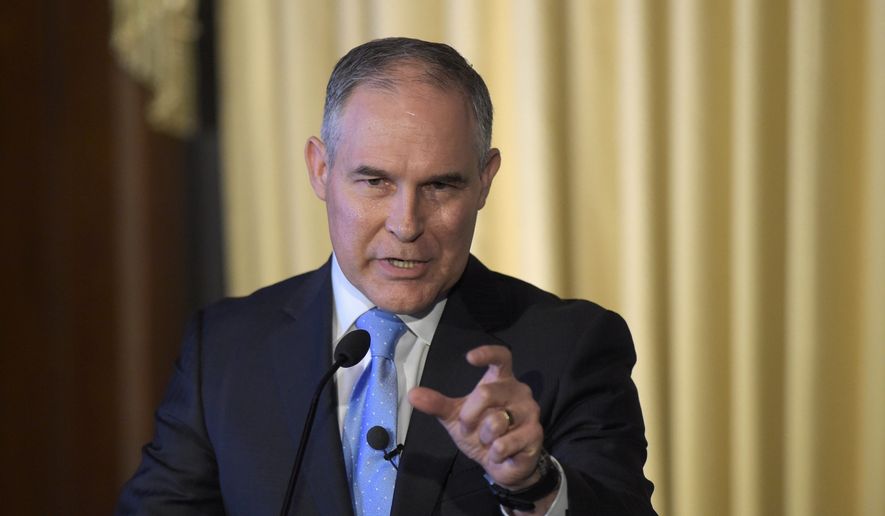Conservatives on Tuesday launched an all-out assault on the Paris climate accord, pressuring President Trump to brush aside moderate voices in the White House — including son-in-law Jared Kushner — and keep his campaign promise to pull the U.S. out of the deal.
With the president in Wisconsin, top administration officials were set to meet Tuesday and debate whether to remain a part of the agreement, which was signed in late 2015 and represents one of former President Barack Obama’s biggest international achievements.
But that meeting was abruptly canceled amid reports of deep disagreement within the administration over how to proceed, with chief strategist Steve Bannon and others favoring withdrawal and Mr. Kushner and other moderate voices reportedly urging the president to honor the deal.
Outside pressure from influential conservatives reached a boiling point Tuesday as groups such as the Competitive Enterprise Institute launched a public relations campaign reminding voters of Mr. Trump’s campaign promise to scrap Paris.
White House spokeswoman Sarah Sanders denied that any of those factors played a role in the cancellation.
“They wanted to have that conversation. Since they haven’t had it, I don’t think they could say that there’s a lot of discord between where everyone is,” she said while traveling aboard Air Force One and brushing aside widespread reports of infighting. “That’s the purpose of the meeting. And so it was, again, scheduling conflicts for today.”
Ms. Sanders sidestepped questions about which way the president was leaning on Paris.
Throughout his campaign, Mr. Trump repeatedly said he would pull the U.S. out of the agreement if he became president, though he softened that stance almost immediately after he was elected in November.
On Tuesday, CEI started a petition drive calling on the president to keep his campaign commitment. The group also posted a video featuring Mr. Trump on the campaign trail decrying the accords.
“President Trump should keep his promise to withdraw from the Paris Climate Treaty. The Paris treaty is a key part of President Obama’s war on America’s most affordable and abundant energy — coal, oil, and natural gas,” the institute says in a brief message accompanying the petition. “But the Washington Swamp and the United Nations establishment are fighting hard to change President Trump’s mind. These are not the people who voted to change the direction of the country.”
Other conservatives are taking direct aim at Mr. Kushner, warning of political consequences if Mr. Trump abandons his campaign promise.
“For his part, Mr. Kushner must know that an obviously broken campaign pledge will impair the President’s ability to be reelected,” Michael McKenna, a Republican strategist who worked on the Trump transition team, wrote in a memo that laid out the reasons for withdrawal.
“He probably also knows (or will know) that there is no mechanism — absent withdrawal — that allows the sort of reworking the agreement that some in the administration have suggested is possible,” Mr. McKenna added.
Indeed, the agreement as constructed doesn’t seem to allow the U.S. to lower its emissions goals and maintain its seat at the international table, as Secretary of State Rex W. Tillerson and others have suggested.
The deal, which is not a formal treaty and carries no noncompliance penalties whatsoever, calls on the U.S. to cut its greenhouse gas emissions by at least 26 percent by 2025 — a massive reduction that would require dramatic changes in domestic American energy policy.
China, the world’s largest polluter, has to do nothing until 2030, when it says it will reach peak emissions and then begin reductions. There are signs, however, that China already is beginning to curb its emissions.
While Mr. Trump apparently is still open to remaining in the agreement, his administration is taking steps that would make it virtually impossible to meet the emissions targets. For example, he has instructed the Environmental Protection Agency to eliminate the Clean Power Plan, a set of national limits on carbon pollution from power plants that is central to meeting the broader emissions goals.
More broadly, Mr. Trump has made clear that he wants to ramp up U.S. oil, gas and coal production and end the Obama administration’s favoritism toward renewable energy. Those policy priorities make the Paris pledge little more than words on a page, even if the nation formally remains a part of the deal.
Even the president’s EPA administrator openly favors withdrawal.
“Paris was just a bad deal, in my estimation,” EPA chief Scott Pruitt said last month.
• Ben Wolfgang can be reached at bwolfgang@washingtontimes.com.




Please read our comment policy before commenting.